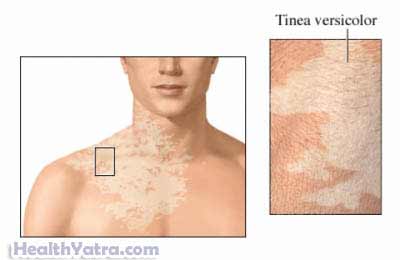Definition
Dermatomycosis is a skin infection caused by fungi or yeast. Tinea versicolor is a type of dermatomycosis. A yeast that affects skin color causes it.
Tinea versicolor can result in uneven skin color, which can last for months after the infection is gone. Tinea versicolor usually affects the back, chest, and neck.

Causes
The fungus that causes tinea versicolor is normally found in small numbers on the skin and scalp. Overgrowth of the yeast leads to infection.
Risk Factors
These factors increase your chance of developing tinea versicolor:
- Age: adolescents and young adults
- Skin: more common in people with naturally oily or excessively sweaty skin
- Climate: more common in warm and humid climates
- Weakened immune system
Symptoms
Symptoms include:
- Uneven skin color, with either white or light brown patches
- Light scaling on affected areas
- Slight itching, which is worse when the person is hot
- Patches that are easier to notice in the summer
Diagnosis
Your doctor will ask about your symptoms and medical history. A physical exam will be done. You may need to be referred to a doctor who specializes in skin disorders (a dermatologist).
The doctor may use an ultraviolet light to see the patches more clearly. A patch may be scraped and sent for testing.
Treatment
Treatment options for tinea versicolor include the following:
Medications Applied to the Skin
Antifungal creams and shampoos such as selenium sulfide , ketoconazole, and zinc pyrithione are usually the preferred medicines to treat the infection. They are usually applied daily for one to four weeks.
Medications Taken by Mouth
Prescription antifungal medications taken by mouth are convenient. You also do not have to take them for a long period. However, they are more expensive and can cause side effects. Some people cannot take antifungal medications. Tell your doctor about any other medications you are taking and any medical problems you have.
After the infection is successfully treated, your skin will naturally return to its normal color. This process usually takes several months. The condition may improve in the winter only to return in the summer.
Prevention
If you know you are prone to tinea versicolor, try to avoid excess heat or sweating.
